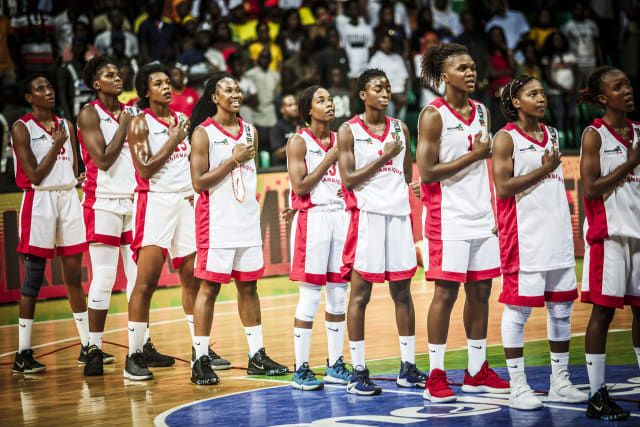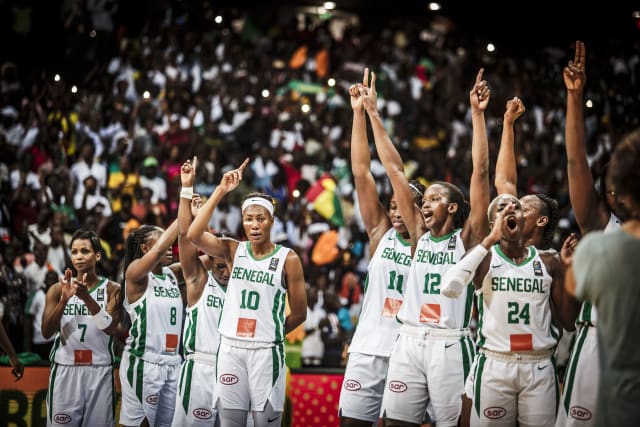Everything to know about the FIBA Women's Olympic African Pre-Qualifying Tournament
MAPUTO (Mozambique) - The race to the Tokyo Olympics 2020 for African countries starts Thursday, November 14, and finishes four days later in the Mozambican capital city of Maputo
MAPUTO (Mozambique) - The race to the Tokyo Olympics 2020 for African countries starts Thursday, November 14, and finishes four days later in the Mozambican capital city of Maputo under the newly-launched pre-qualifying tournament.
The Pre-Qualifiers for the Tokyo Games is part of FIBA's major new qualifying system, which also changes the way of qualification for the next FIBA Women's Basketball World Cup.
Mozambique will host the FIBA Women's Olympic Pre-Qualifying Tournament 2019 for Africa.
— Júlio Chitunda (@JChitunda) October 8, 2019
All tournaments will take place during the pre-qualifying window, which is between November 10-18, 2019.@FIBA #WOQThttps://t.co/yFKmhyWAjC pic.twitter.com/hq9fRw4Yxy
Here's everything to know about the FIBA Women's Olympics 2020 African Pre-Qualifying Tournament.
Six countries - including hosts Mozambique, Angola, Democratic Republic of Congo (DR Congo), Mali, Nigeria and Senegal - are divided into two groups of three teams each.
They will play a round-robin format in their specific groups with the winner of Group A facing the second team in Group B while the winner of Group B will come up against the second ranked team in Group A in the Semi-Finals.
The two winners of the Maputo-showdown Semi-Finals will not play a Final as they will automatically advance to the 16-nation FIBA Women's Olympic Qualifying Tournaments (WOQT) in February next year where the top three teams from each of the three WOQTs will qualify for the 2020 Tokyo Olympics.
WOQT HISTORIC
With exception of DR Congo, all five teams have previously participated in the WOQT, (Angola and Senegal (2008), Mali and Mozambique (2012), and Nigeria (2016) - however, none of the African teams have ever made it to the Olympics via WOQT.
In Group A, African champions Nigeria will go up Mozambique and DR Congo, while Senegal - who finished runners-up at the 2019 African Championship on their home soil - will face Angola and Mali.
HOW THEY QUALIFIED TO THE PRE-QUALIFIERS
The six teams reached the pre-qualifying tournament after finishing in the first six places of the FIBA Women's AfroBasket 2019.
NIGERIA
Arguably the most talented and competitive team in the continent in recent years, Nigeria not only rank as the No.1 on the continent - according to FIBA' World Ranking - but they also head to Maputo as legitimate contender to one of the two spots on offer for the WOQT.
And numbers and facts do justice to Nigeria's dominance in African women's basketball.
After a disappointing third-place finish at FIBA Women's AfroBasket 2015 in Yaounde, the Nigerian reinvented their game by bringing a few new players and coaching staff. The likes of guards Promise Amukamara and Ezinne Kalu and forward Evelyn Akhator added a huge value to the D'Tigresses. Sam Vincent coached the team to the 2017 continental title - their first since 2005 - and Otis Hughley followed suit two years later.
In the process, the Nigerians arrive in Maputo with an impressive 14-0 mark in Africa, dating back to October 2015.
MOZAMBIQUE
Nigeria's main opponent in Group A, Mozambique have been equally impressive in the African scene.
Mozambique may rank at No. 4 in Africa, but playing in front of some of the most passionate basketball crowds on the continent, not only give Mozambique a huge boost, but it also makes them a contender to avoid.

With the emerging Leonel Manhique - who replaced spaniard Julian Martinez at the helm of the team - and the expected presence of high-flying trio of Ingvild Mucauro, Leia Dongue and Tamara Seda - the Mozambicans have everything in their hands to return to the WOQT for the first time since 2012 when they fell short to advance to the London Olympics.
As long as the Mozambicans avoid any type of pressure and keep their composure, they can prove a real test to Nigeria. A fourth-place finish at this year's FIBA Women's AfroBasket may sound insignificant, but for Mozambique, it is a highly-significant, considering the generation transition that the team has been experiencing in the past six years.
DR CONGO
And although DR Congo may seem a bit of outsiders, but they can not be underestimated, especially as this is a team working hard to return to their glory days in Africa.
GROUP B
Speaking of teams trying to restore their past achievements, Senegal made it to Maputo desperately looking to shrug off their two consecutive disappointing second-place finishes in as many FIBA Women's AfroBasket.

Head coach Cheikh Sarr has been playing a huge part in the team's rebuilding, but fighting for a place in the WOQT without five players from the FIBA Women's AfroBasket 2019 will certainly prove challenging, although the Senegalese - ranked No.2 in Africa - remain a respectable opponents.
Favourites in Group B, Senegal will need to overcome their arch-rival Mali, who will not only rely on Beijing Olympics' duo of Meiya Tirera and Naignouma Coulibaly but, more importantly, Mali will count on the services of must-watch guard Touty Gandega.
She is quoted as saying to FIBA.basketball: "The target for us is to win both games against Senegal and Angola. It will be hard and we already know that but we want to play at the Olympics like our elders did in 2008."
Meanwhile, short-handed Angola, who have been inexplicably successful on Mozambique soil, remain ambitious ahead of the competition, but all-around guard Italee Lucas will have to do a bit of everything - again - to give her team a chance of dreaming with a spot at next year's WOQT, a competition she has never participated in.
Click here to watch the games, and follow our live commentary blog, here.
FIBA